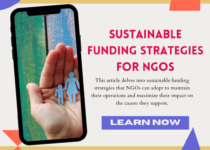10 Ultimate Tips on How To Master NGO and Donor Relationships: A short guide for NGOs to help create a long term partnership with Donors
Introduction: 10 Ultimate Tips on How To Master NGO and Donor Relationships, here is a short guide to help you understand the Donor’s perspective for a long term partnership with your NGO. This guide will help you understand how a Donor wants to relate with NGOs and what improvements you can do to strengthen your relationship with them.
Yes I want to LEARN How to Leverage Technology in NGO Operations
NGOs need to clear the picture in their mind, first, with whom they are dealing with?
There are two ways to look at the funding agencies, first, as an organization having their own mission and vision and an autonomous entity and second, as individual humans that runs the show for the organization.
Keep in mind that.
Every NGO inherently possesses either current or potential donors, as NGOs rely on funding agencies (donors) for their survival. Donors serve as the backbone of NGOs, crucial for sustaining their operational and intervention programs in various fields. Frequently, NGOs grapple with how to effectively cater to both their existing and potential donors.
This indicates that they face challenges in understanding the requirements of their current donors while also being uncertain about the best approach to engage with new prospective donors.
The complexity extends beyond this point, considering that interactions occur between individuals behind the scenes. Evaluating the personality of the person with whom one is communicating presents a considerable challenge. Funding organizations are staffed by individuals with distinct and unique personalities.
This aspect is of significant importance for NGOs to recognize. The solution perhaps involves a fundamental shift in perspective, guiding NGOs to approach donor agencies in a manner that is entirely distinct from their conventional expectations.
Yes I want to learn Monitoring & Evaluation for NGOs>>>>>>Check Out Here
Right, NGO should be very careful and have to learn to deal with the both the Funding Agency as a whole and the humans that operates the organization.
By the time you will reach the end of the guide you will have clear picture on the perspective of a Donor agency.
These tips here are considered very powerful because I have myself learned these during my experience and handling a variety of funding agency
10 Ultimate Tips on How To Master NGO and Donor Relationships
Tip 1: An aware interaction
Taking into consideration that direct interaction occurs with individuals behind the organization’s facade, it is pivotal to develop a new level of awareness. This heightened awareness of the human factor serves as the foundation for meaningful interactions with donors over the long term.
Recognizing that these individuals possess their own distinct preferences and boundaries is indicative of the necessity for cautious engagement, especially in terms of avoiding excessive communication or assertively presenting ideas.
Approaching the situation, whether through email or another means, with your utmost effort and subsequently allowing the information to be absorbed and considered by the donors is crucial.
Demonstrating respect for their boundaries also communicates your genuine commitment to the cause rather than merely seeking monetary grants.
At the same time, by the virtue of ongoing interactions and research, endeavor to gather essential details about your donor. It will help you enhance your future communications with the funding agency.
Tip 2: Principle before personalities
How can one effectively handle interactions with unfamiliar individuals? Given the uncertainty surrounding their personalities, it’s prudent to adhere to principles of humility, mutual respect, kindness, patience, and tolerance, regardless of their disposition.
By maintaining these values, not only can you establish a strong foundation for a lasting relationship, but you’re also likely to receive the same treatment in return. Even if an immediate agreement isn’t reached, these principles can leave a lasting impression, potentially opening doors for future grant opportunities.
Remember, individuals with strong ethical values tend to be remembered, contributing positively to both your NGO’s reputation and its ethical standing.
10 Ultimate Tips on How To Master NGO and Donor Relationships
Tip3: Remember Donors are technically sound
A funding agency collaborates simultaneously with numerous NGOs, necessitating their adeptness in comprehending even the minutest particulars. It’s imperative for NGOs to deeply grasp this reality: donors possess a high level of technical proficiency, leaving no room for manipulation.
Thus, when formulating a scenario, presenting data, drafting proposals, or providing information in applications, utmost authenticity is essential. Bear in mind, they possess unparalleled insight into the field, making it critical to avoid any misrepresentation as it could result in disqualification from both current and future funding opportunities.
Tip 4: Donors are more logical headed
Donors’ increased insight and experience garnered over the years render them more pragmatically inclined. The likelihood of obtaining approval and funding hinges upon the legitimacy of the cause addressed by your intervention, which requires a comprehensive rationale.
Evidently, lacking a well-founded justification, securing grants from donors becomes an uphill battle. NGOs must internalize this reality and systematically gather foundational data from the field to substantiate their intervention’s rationale. Instances exist where NGOs tend to emphasize their organizational profile rather than focusing on a concrete proposal.
As previously discussed, donors possess significant technical acumen. Therefore, progressing towards funding approval entails the necessity to persuasively engage their analytical perspective, underscoring the program’s indispensability for a specific cause.
10 Ultimate Tips on How To Master NGO and Donor Relationships
Check Here Complete List of Wealthiest Charitable Organization around the Globe
Tip 5: Do not push Away by Overdoing Communication
In their eagerness to secure funding, NGOs occasionally inadvertently repel donors through assertive communication, attempts at showcasing marketing prowess, and excessive attempts at impressing.
Regrettably, these approaches accentuate desperation rather than the organization’s merit. Balancing persuasion without exuding neediness is essential. Employing such tactics often signals an overzealous fundraising campaign.
Donors continually encounter an influx of funding appeals, applications, calls, and proposals. It is neither feasible nor obligatory for them to entertain every entreaty. NGOs should exert their utmost effort and extend patience, allowing donors the space to meticulously assess their appeal.
It’s prudent to await an appropriate interval before initiating a follow-up, and to grant donors ample time to thoughtfully evaluate the proposal.
Tip 6: Donors Have Limitation
Comprehending the donors’ constraints holds significant importance for NGOs. Various constraints, including time constraints, grant size limitations, specified areas of operation, geographical focus, alignment with organizational mission and vision, collectively constitute a framework that NGOs must respect concerning donors.
Attempting to compel donors to alter their policies is often futile; exceptions might occur under specific partner circumstances rather than through external pressure.
Thus, it rests upon NGOs to conduct thorough research beforehand to ensure the right match with potential donors. A case in point is when a donor’s focal interest is HIV/AIDS within the geographical scope of Sub-Saharan Africa.
This renders only those NGOs engaged in HIV/AIDS intervention within Sub-Saharan Africa eligible, while entities that don’t meet these criteria are automatically excluded. Consequently, it’s advisable to verify the donors’ prerequisites in advance to establish compatibility.
10 Ultimate Tips on How To Master NGO and Donor Relationships
Tip 7: Donors Have High Standards
The pivotal elements steering funding agencies revolve around their affiliations with grantees upholding the utmost standards.
Donor agencies invariably seek alliances with organizations that possess an exemplary public image, impeccable financial records, and robust ethical principles.
They shun any association that might imperil their reputation or involve funds inappropriately.
Hence, donors maintain stringent criteria, prioritizing elevated standards and gravitating towards entities that embody such values.
NGOs, in response, should cultivate a framework of elevated standards encompassing aspects like staffing structure, financial administration, report crafting, on-field data collection, adept presentation abilities, as well as their presence on social media and in the public eye.
Steal Our Best Premium Resource for Proposal Writing For Free>>>>Click Here
Tip 8: Donors are attracted to Modest Approach
NGOs ought to adopt a modest stance when dealing with donors. Overstating accomplishments and indulging in self-praise might inadvertently yield adverse outcomes instead of favorable ones.
Making hasty commitments that may prove challenging to honor down the line is ill-advised. It’s imperative to possess a clear understanding of one’s capabilities and limitations.
NGOs, like any entities, contend with constraints such as geographical scope, staff size, existing resources, and financial limitations. Maintaining a transparent approach from the outset is crucial, enabling donors to form an accurate perception of the NGO.
Falsified information or misleading details can ultimately mar the partnership, underscoring the significance of maintaining integrity throughout the interaction.
Tip 9: Understanding the Donor’s Predicament
NGOs should recognize the complexities faced by donors, who grapple with their own set of challenges.
Donors are accountable to various entities, including their own supporters, governmental bodies, tax authorities, higher supervisory bodies, and stringent deadlines that they must contend with.
Should NGOs extend an understanding of these factors, it would be highly valued. Such considerate awareness could yield manifold benefits from donors.
In truth, donors stand as valuable reservoirs of knowledge, and their insights for enhancing NGO operations can be akin to discovering a treasure trove.
Engaging in resource sharing creates a scenario where all parties gain. Donors possess firsthand experience in evaluating projects, applications, proposals, and funding requests. This valuable expertise can be tapped into for improving proposal composition, developing sound log frames, crafting effective applications, and acquiring insights on the monitoring and evaluation of ongoing projects.
10 Ultimate Tips on How To Master NGO and Donor Relationships
How About Learning NGO Pitch Deck Strategy
Tip 10: Meaningful Engagement of the Donors
In the realm of human interactions, gestures of kindness, expressions of gratitude, and well-wishes during seasonal occasions are universally cherished.
Equally, there exists a myriad of avenues through which one can meaningfully connect with donors. Acknowledging the busyness of donors, it’s reasonable to anticipate that not every invitation extended will receive a response.
Yet, inviting them to partake in NGO events like founder’s days, annual ceremonies, or program events can be instrumental in nurturing a robust rapport.
Immersing donors in on-site activities within the field also stands as a powerful method of fostering engagement with the NGO’s initiatives.
Consistently providing updates on intervention progress and offering insights into the allocation of their contributions is paramount.
Offering transparency about the program’s trajectory and challenges encountered in the field resonates with donors.
Their expertise and guidance, shared through feedback and support, hold the potential to propel the NGO’s growth, a sentiment that they hold dear.
For a long partnership, learn the rules, play the game.
On a closing note
Learn from your own experience, build upon your values.
In the journey of building successful partnerships between NGOs and donors, understanding, transparency, and thoughtful engagement are paramount.
By recognizing donors’ constraints, maintaining integrity, and actively involving them in the NGO’s endeavors, a strong foundation can be laid for lasting collaborations.
Balancing modesty with clear communication and leveraging donors’ wisdom can lead to mutually beneficial outcomes.
In embracing these principles, NGOs can not only secure vital support but also foster relationships that enrich their missions and empower positive change.
Our information bears no cost (it’s absolutely FREE), don’t let valuable information slip away.
Join our community of avid readers who are always in the know. Subscribe to our website; stay connected and engaged with the latest news, trends, and developments by subscribing today.
(PUSH the bell ICON)
Leverage the power of knowledge to propel your organization to new heights. Don’t miss out – explore our content
- Latest Funds for NGOs,
- NGO Jobs
- Resources (Helpful Guides and Courses)
- Premium Resources
- NGO related articles
Empowering Humanity through Funds, Resources and Collective Action
Sharing is Appreciated



